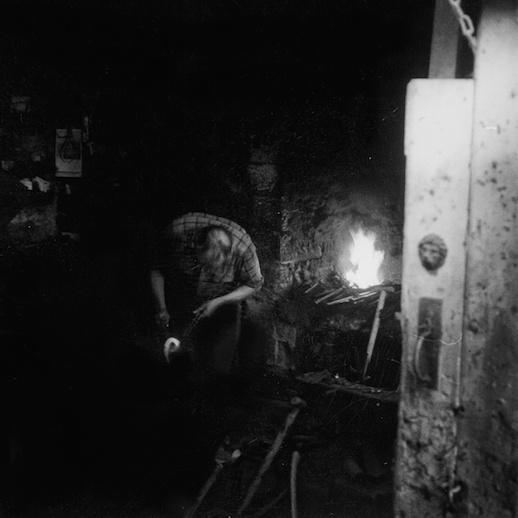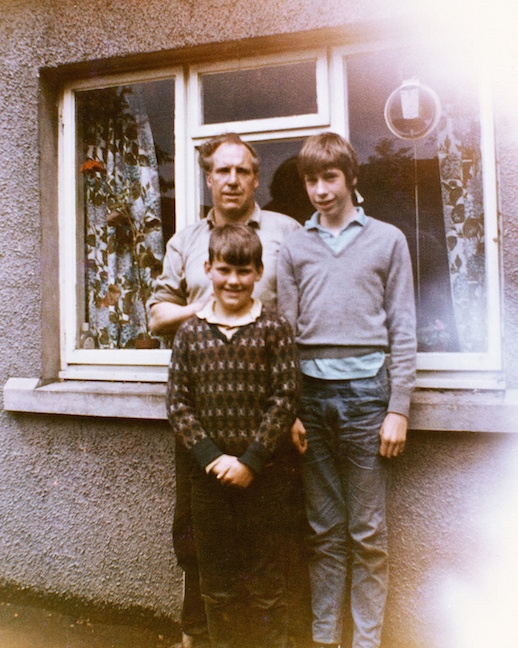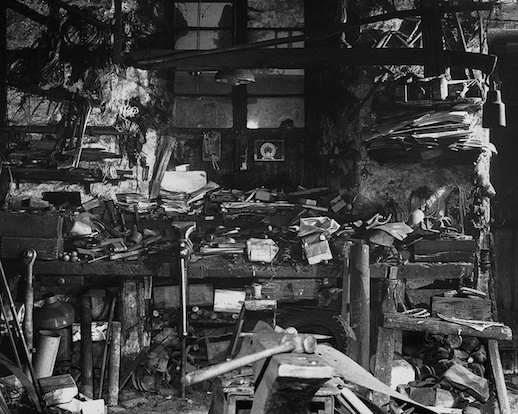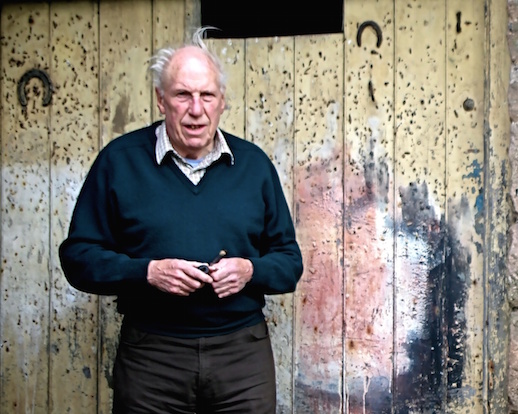Part 4: Future and Past
 Dad working on a horseshoe, circa 1980s
Dad working on a horseshoe, circa 1980s
Words and pictures: Ron Hewit
Sometimes I imagine how life would have turned out if I’d taken over from my dad and become the village blacksmith and farrier, carrying on the family tradition, the sixth generation of Hewits to work with hot metal and horseshoes. In my mind I would have taken the business in a new direction. Out would have gone the heavy agricultural work and instead I would have created spectacular and expensive decorative ironwork for the home and garden, or extravagant shimmering sculptures. Perhaps I would have shoed the occasional horse just to keep my hand in. I can almost see myself silhouetted by a fiery forge, bent over the anvil, tapping expertly with a hammer, a picture of concentration, creating things of metallic beauty – an artisan in a plaid shirt.
All fantastical nonsense, of course. The reality is that when I was growing up I dreaded the fact that one day I might be the next blacksmith. I knew it was an outside chance because my brother John is five years older and would be the one to take over when the time came, but I couldn’t be certain. Then John left school and began an apprenticeship with a local engineering firm (oh, the irony) and the responsibility was back with me, or at least that’s how it felt. I didn’t raise the subject with Mum and Dad (some 13-year-olds might have done, but not this one) and it preyed on my mind for years until I left school. By then my parents were encouraging me to go to college and do something different (not that I really knew what I wanted to do) and the subject of taking over the business simply didn’t come up. College happened, the bright lights of Edinburgh drew me away, then London’s brighter lights beckoned. I left Heiton aged 17 and I’ve now lived far longer in London than I did in the village where I was born.
I would have been a terrible blacksmith. At a push I might have picked up the necessary skills but I wouldn’t have had the knack, it would always have been a struggle. I wasn’t even that good at making Airfix kits if I’m honest; too slapdash and impulsive. Only a few months ago I got another reminder of my lack of gumption. I was paying a visit home and decided to cut the grass to help out. I could get the mower to start but after a few seconds the engine spluttered and stopped. Again and again I started it only for the engine to falter and die. Like a clueless boy I had to go and get my dad. Even though he was desperately ill by then he toddled outside in his slippers and immediately solved the problem by turning on a valve on the fuel line. It made me think of all the million and one other things that my dad knew and that I, sadly, would never get the chance to learn from him. How, I wondered, will I cope when he’s gone and can’t answer my questions and keep me right.
 My dad with my brother John (right) and the author in the early 1970s
My dad with my brother John (right) and the author in the early 1970s
It’s a different matter for John – he has the same engineering nous that my dad had; the ability to create and repair and make it look easy. When he left school in the mid-70s the business was faltering but he could have joined my dad and breathed new life into it. I ask him why he chose not to and he explains that to succeed he would have had to convince Dad to embrace the possibility of change and take the business in new directions and perhaps he wouldn’t have been receptive. It’s all hypothetical. My grandad had set the tone for how things were done many years earlier and he had been a hard man to please, a traditionalist who liked things done the way he wanted. That attitude probably came from his own upbringing – his father had died young so he had to take over the business and look after the family when he was barely out of his teens. He had to be tough to survive that, but maybe he was too tough, too set in his ways. My mum remembers Dad having to ask for a pay rise after John and Sandra were born and how, grudgingly, my grandad had agreed.
Dad didn’t have any option but to follow in my grandad’s footsteps and it makes me wonder what he would have done if he’d had the chance to do anything he’d wanted. Dad was a talented man. As well as being an accomplished blacksmith and master farrier, he could turn his hand to decorative work. I have a magazine rack that he made decades ago constructed from deceptively simple spirals and curves; a poker that he made has a handle made up of small interconnected metal loops that’s beautiful to look at and fits wonderfully in the hand; he made the gates that still hang at the foot of the drive to my mum’s house; and just a few years ago he constructed a metal side table for me that’s elegant and beautifully proportioned. If he’d chosen to concentrate on work like that I like to think he would have been very successful, but we’ll never know. I can’t recall now if I ever asked him what his dream job might have been, but it’s immaterial. He did what he had to do.
 A place for everything… the smithy workbench in the mid 1980s
A place for everything… the smithy workbench in the mid 1980s
The saddest thing is to learn from my mum that my dad felt guilty about having to wind up the family business; sad that he was the last in a long line of blacksmiths. After all, no one blamed him for its failure, and his achievements speak for themselves. He was a craftsman not an entrepreneur, and I know which I’d rather have as my dad. I recall a conversation I had with him a few years ago when I was describing what I do in my publishing job in London and he looked slightly bemused and said that such lofty things were beyond his comprehension. When I pointed out that what he’d achieved in mastering the arts of a blacksmith and farrier and then using them so diligently for five decades, carrying on a great rural tradition and working for people who were friends foremost and customers second, was greater than anything I’ve ever done, he only gave a nod and a smile, and after one of his long, thoughtful pauses he said, “Aye, maybe so…”
Time rolls on. Now it’s the last weekend in September and I’m back in Heiton to see the family for the first time since Dad’s funeral in June. As I arrive at my mum’s house it’s late in the afternoon and the sky is dulled by cloud but, way above my head, swallows and house martins are wheeling round and round in slow graceful arcs, dozens and dozens of them. It’s a wonderful sight and my first reaction is to call my dad and tell him to come outside so that we can stand together and watch this great gathering of birds and speculate how many there might be, where they have come from and where they will go – then I remember that’s impossible. I watch alone for a few minutes then go inside.
The next day the swallows have gone. Not one remains, the skies are empty, the telephone wires are bare, summer has turned to autumn. The swallows will return next May, an unstoppable force of nature, but for the first time in decades Dad won’t be there to see them. Time rolls on…
 Dad in front of the smithy doors in 2012, the hole he made for swallows to come and go clearly visible
Dad in front of the smithy doors in 2012, the hole he made for swallows to come and go clearly visible
View the previous Last Blacksmith posts here